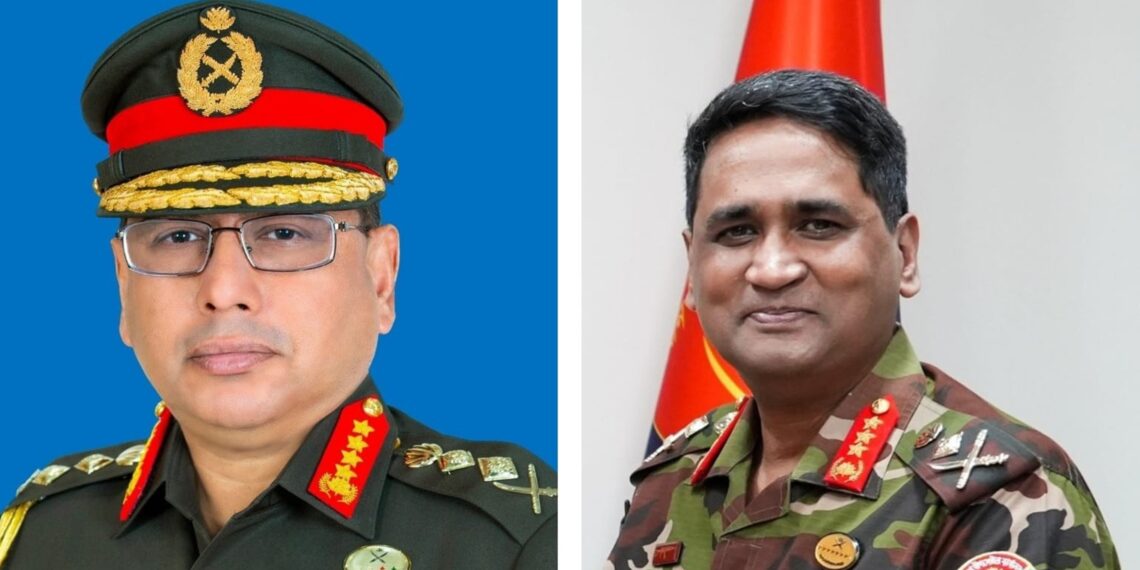Bangladesh Army chief General Waker-uz-Zaman did move on May 11 to sack Lieutenant General Kamrul Hassan, the Principal Staff Officer (PSO) in the Armed Forces Division (AFD) under the Chief Adviser’s Office, but this was thwarted by interim authority head Mohammad Yunus, careful inquiries by Northeast News have revealed.
This was a manifestation of the vertical split in the Army top brass over the controversial issue of humanitarian corridor which Bangladesh’s National Security Adviser Khalilur Rahman, a US citizen, is strongly supporting.
Indeed, well-placed Bangladeshi security agency sources said that Yunus and Khalilur Rahman moved ruthlessly to “engineer” the removal of Foreign Secretary Jashim Uddin who was staunchly against the humanitarian corridor and was “in alignment” with the majority view within the Army. Jashim Uddin was removed on another pretext related to a bill for a certain club.
Sources said that a top functionary within the Yunus-led interim regime is “also against” the humanitarian corridor as it will adversely impact Bangladesh’s sovereignty.
Even as the “deep” division within the Army is still not fully out in the open, sources said that a majority of the General Officers Commanding (GOCs) are in “full support” of Gen Zaman.
More importantly, sources said that Khalilur Rahman played a key hand in keeping the US authorities, including the American Charge d”Affaires Tracey Ann Jacobson in the loop. One outcome of the Gen Zaman-led faction’s opposition to the humanitarian corridor was the cancellation of the Army chief’s visit to the United States on May 11.
This visit was till May 23 and during his stay there he was to attend an important meeting of the Land Forces Pacific (LANPAC) Symposium and Exposition-25, also conveyed their regrets to him. This four-day conference was scheduled to start on May 11 at Honolulu in Hawaii.
Highly placed sources said that Jacobson met Lt Gen Kamrul Hassan and her intervention appears to have saved him from certain sacking. Lt Gen Hassan is said to have rushed to the US Embassy in Dhaka’s Baridhara neighbourhood where he and Jacobson were closeted for nearly two hours.
Lt Gen Hassan and the Directorate General of Forces Intelligence (DGFI) are part of the group who view the “national security” issue (humanitarian corridor), that needs a “decisive response”, it seeks to play a “more active and comprehensive role in securing the border, ensuring stability, and ensuring the nation’s sovereignty”.
Furthermore, this section is of the opinion that the “only way to effectively address the ongoing border security challenges, maintain a stable humanitarian corridor and reduce the burden on the BGB is declaring the Bangladesh-Myanmar border a Military Operations Zone (MOZ)”.
ALSO READ: ICJ lawyers in Cox’s Bazar Rohingya camps focus on continuing flight of refugees from Rakhine State
This group seeks to “take full control of the border and secure it effectively, enabling the proper distribution of resources and freeing up the BGB for other important security tasks, including the managing the border with India”.
For the opposing group, led by Gen Zaman, the prevailing security situation along the Bangladesh-Myanmar border is an outcome of the geopolitical and geostrategic measures that the United States seeks to put in motion by employing the Bangladesh Army in clandestinely backing the Arakan Army and other People’s Defence Forces in Myanmar.















